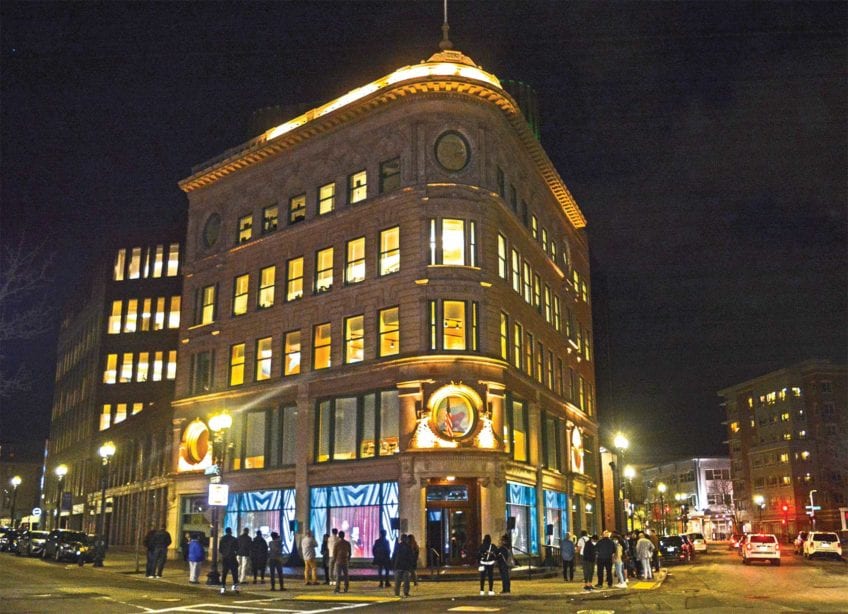The most frequently produced play in the U.S. is “Our Town.” Speaking of his Pulitzer Prize-winning play, which debuted in 1938, Thornton Wilder (1897-1975) said his intent was to set “the life of a village against the life of the stars.”
Its portrayal of daily life in the fictional town of Grover’s Corners, NH, orchestrated by a no-nonsense Stage Manager, centers on two families, the Webbs and the Gibbs, whose teenagers, Emily Webb and George Gibbs, fall in love and experience marriage and death in the course of 12 years, from 1901 to 1913.
Simply reading this play can be a transporting experience. And a decent production will linger with you for years to come.
The Huntington Theatre Company is presenting the Boston premiere of a particularly strong staging of this play through January 26 in the Roberts Studio Theatre at the Boston Center for the Arts in the South End.
Directed by David Cromer, who also performs the role of Stage Manager through December 30, when Joel Colodner replaces him, the production received the Obie Award for Directing and Lucille Lortel Awards for Best Revival and Direction in 2009.
Faithful to Wilder’s minimalist stage instructions, the production employs few sets and props. Tables and chairs stand in for the houses of the Webb and Gibbs families. The audience sits on three sides of the stage, which is simply a plywood-covered floor.
Divided into three acts with two 10-minute intermissions, the production reunites
Cromer with veterans of the much-lauded Off Broadway staging: Stephen Dobay, scenic design; Alison Siple, costumes; Heather Gilbert, lighting; and Jonathan Mastro, who composed and directed the music for chorale and piano, which actors perform in a loft above the stage.
Overhead, a constellation of rustic barn lights illuminates the audience as well as the 32 actors during the first two acts. In third act, the lights dim, evoking a galaxy.
This production pares down Wilder’s spare staging even further, blurring the boundaries between actors and audience. Rather than turn-of-the-century costumes, the cast wears casual contemporary clothes—jeans, flannel shirts and sweaters. Actors who play the newsboy and milkman move through the aisles as they deliver their wares. As latecomers take their seats, they seem to be part of the play.
Cromer’s Stage Manager is matter of fact, even brusque, as he introduces scenes, and as each act begins, he brandishes his cell phone to signal the audience to turn off their devices.
The first act introduces daily life in Grover’s Corners. Melinda Lopez conveys the serenity and weariness of Mrs. Gibbs as she goes about her chores. She mimics the motions of pulling ingredients off the pantry shelves and preparing breakfast for her family.
Scenes shift, as the Stage Manager summons the town’s scholar, Professor Willard (a droll Richard Arum) to give a brief lecture on the prehistory of the town that places the geology and human life of Grover’s Corners within eons of time. Next, Mr. Webb (Christopher Tarjan), the editor of the local newspaper, provides the town’s “political and social report.”
Moving from cosmic and community spheres to individual lives, the play turns to the budding relationship between George (an earnest Derrick Trumbly) and Emily (Therese Plaehn, who brings a convincing sweetness to her role).
The second act, three years later, concludes with their wedding, humorously disrupted by the gushing outbursts of Mrs. Soames (Marianna Bassham, a gifted comedian) but ultimately a scene of tranquil joy. Deft lighting highlights telling details, like the tenderness on the face of George’s father (Craig Mathers) as he watches his son take his wedding vows.
The sublimely staged third act takes place in a cemetery nine years later. Seated in angled rows and illuminated by raked light, the actors portraying the town’s dead resemble tombstones. They speak to each other without moving their bodies. A funeral procession enters and the newly diseased person implores the Stage Manager to let her go back and relive a day in her life.
One of her dead neighbors tells her, “Choose the least important day in your life. It will be important enough.”






